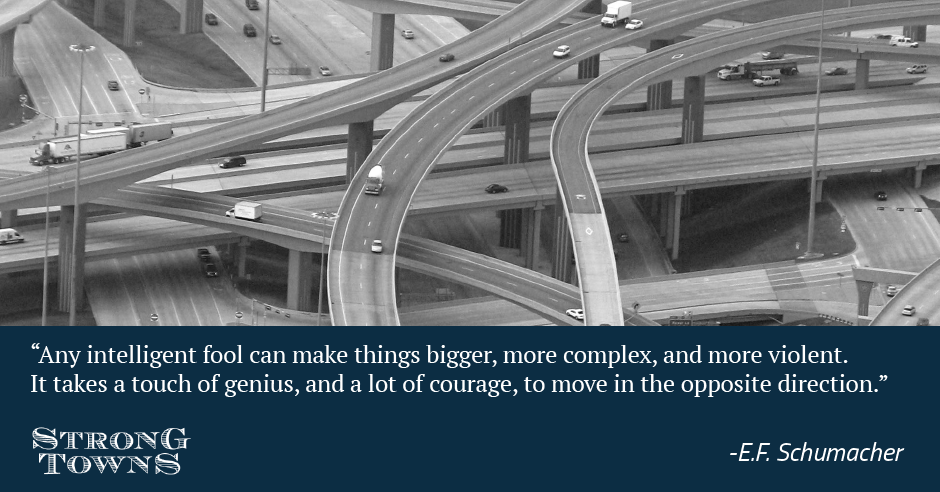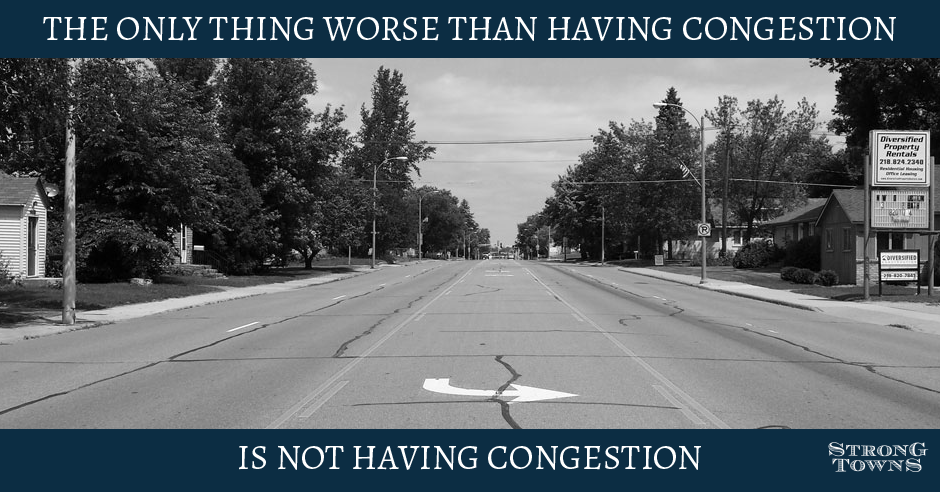We talk a lot about issues that affect the way we live in the city here at Broken Sidewalk. Big issues like transportation, preservation, development, and urbanism. All of these subjects are closely related—pull one string and you affect another part of the overall system.
But as we scrutinize the increasing flow of development projects and improvements in the core city, the fact remains that the standard development pattern in Louisville is sprawling and auto-centric in nature. For every hundred new housing units inside the Watterson, there are several hundred proposed outside. A new store on Bardstown is countered with a new stripmall on Dixie Highway. It’s hard to keep up.
No one has explained this better than Charles Marohn, founder of Strong Towns. Marohn is a professional engineer from Minnesota who began to realize the faults in the way we are building our cities. He is on a mission to shift our built environment back to one that’s sustainable, financially strong, and resilient.
According to Strong Towns:
Following World War II, the United States embarked on a great social and financial experiment that we know as suburbanization. It created tremendous growth, opportunity and prosperity for a generation of Americans that had just lived through economic depression and war.
What we seemingly didn’t stop to consider at the time was that the way we were building our places – spread out across the landscape – would be extremely expensive to sustain, far greater than the relative wealth the approach would generate.
Local governments today are being crushed by their long term obligations. To solve today’s cash problems, they are being encouraged to take on even more liabilities. We desperately need to find a different approach.
Fortunately for for us locally, the Kentucky Heritage Council is bringing Marohn and Strong Towns to Louisville for a two-day conference on the built environment at the Kentucky Center, and you should attend. The Strong Towns Conference takes place Thursday, September 24 and Friday, September 25. The event is open to the public and tickets cost only $25. Proceeds benefit participating nonprofits (details below).
“The current system emphasizes continuous growth instead of resiliency and adaptability,” Marohn said in a statement. “Communities must learn to act incrementally and use realistic, long-term financial analysis to guide spending.”
A series of panel discussions will explore “how local governments can build wealth and more effectively identify projects that generate a high return on public investment,” according to the Council.Topics will range from urban design, the benefits of small-scale development, transportation planning, preservation, and complete streets.
Speakers include Marohn from Strong Towns; Jim Kumon, executive director of Incremental Development Alliance; John Anderson from the Congress of the New Urbanism; Jim Lindberg from the National Trust’s Preservation Green Lab; Craig Potts, Heritage Council executive director and state historic preservation officer; Steve Ervin, Paducah planning director, and Kitty Dougoud, Kentucky Main Street Program administrator.
“Given recent community conversations about development projects across the state, we feel the timing of this conference could not be better,” said Potts in a statement.
Tickets cost $25 in advance or $35 at the door and can be purchased here. The event takes place at the Kentucky Center for the Performing Arts’ Bomhard Theater. More information and a complete schedule can be found on the Heritage Council’s website.
The Heritage Council is partnering with Preservation Kentucky, Preservation Louisville, the Kentucky Main Street Program, and Friends of Kentucky Main Street. Additional support is provided by KHC member Nana Lampton and Hardscuffle Inc.





Strong Towns has a great message. They advocate against sprawl and for downtown reconstruction and do so from a fiscal conservative standpoint. That’s counter to the voices dominating the conversation in Louisville. Strong Towns does not stress the preservationist aspects and they also seem to be fairly disinterested in the idea that cities should be turned into entertainment factories to accommodate the “creative class”. Preservationist arguments fall on deaf ears in Louisville. That leaves the booster of the latter as pretty much the only force for urban redevelopment in Louisvill. These are almost always propped up with public assistance (read debt) in some form or the offer, and their long term proposition is not entirely compelling: step 1: jerbs jerbs jerbs in construction; step 2: ?, step 3: public debt payments backed by newly generated prosperity. This works somehow?
So the urbanist’s message needs to shift in Louisville, away from the preservationist line of reasoning which is not convincing the heart and minds of residents, and away from chasing after mega-projects that have a very dubious return on investment over the long term. Hopefully Strong Town’s discourse helps that shift.